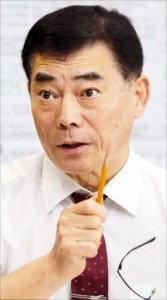[Interview] Korea military fund aims to cash in $700 mn bad assets within 3 yrs
By Oct 09, 2018 (Gmt+09:00)
LG Chem to sell water filter business to Glenwood PE for $692 million


KT&G eyes overseas M&A after rejecting activist fund's offer


Mirae Asset to be named Korea Post’s core real estate fund operator


StockX in merger talks with Naver’s online reseller Kream


Meritz backs half of ex-manager’s $210 mn hedge fund


The Military Mutual Aid Association (MMAA) will liquidate half of its 1.6 trillion won ($1.4 billion) worth of non-performing assets by early 2021 and put the proceeds to new alternative and global investments, said its chief executive officer.
MMAA, a $9 billion savings fund for South Korean military officers and personnel, has been struggling to retrieve investments it had made in domestic real estate projects since the early 2000s.
Some of them, worth 1.6 trillion won at end-August, turned sour because of the property market slump and delayed development in the wake of the 2008 global financial crisis.

“We will liquidate 800 billion won ($703 million) worth of specially managed business within three years without fail,” Do-ho Kim, CEO of the MMAA, told the Korean Investors in an interview on Oct. 7.
“We will cash them in through public sales or in other due process, and use them as a new source of global and alternative investments.”
Kim, a former F-5 fighter jet pilot and air-vice marshal, was installed as CEO in January of this year for a three-year term.
MMAA categorizes nine non-performing investment projects of 1.6 trillion won as “specially managed business.”
“They may be booked as a loss, but we need to bear the humiliation for the future of our association. It is in order not to commit the Concorde Fallacy again.”
Kim referred to the so-called sunken costs lesson, which means any decision to continue a business should not be based on what has already been spent.
Of the MMAA’s 10.4 trillion won ($9.1 billion) assets at end-2017, investment assets accounted for 6.9 trillion won.
Hit by the soured investments, its capital surplus shrank by a third to 300 billion won at end-2017, compared with 900 billion won in 2007.
MMAA will curtail real estate project investments which make up 40% of its portfolio, as well as domestic and global equity investments.
Instead, it plans to bump up the proportion of global investments to 40% by 2020 from 30.5% at end-August.
“We will aggressively seek after new growth sectors such as new renewable energy, IT and aerospace industries. We will use cash flows as a main criterion for new investment,” the CEO said.
To boost assets, MMAA is seeking to increase individual contribution limits from the current one million won a month.
In 2016, it committed 40 million euros to a European infrastructure fund of Macquarie which invested in a parking lot in Spain.
The investment is expected to produce annual returns of 6~7% for the next 14 years, based on rental incomes, according to Kim.
MMAA’s investment return in 2017 was 6.5%, below those of the National Pension Service and two bigger savings funds in South Korea – Korean Teachers Credit Union and Public Officials Benefit Association.
The graduate of South Korea’s Air Force Academy is the first CEO of MMAA from the Air Force. All his predecessors came from land forces.
Write to Daehun Kim at daepun@hankyung.com">
daepun@hankyung.com
Yeonhee Kim edited this article
-
 Real estateMirae Asset to be named Korea Post’s core real estate fund operator
Real estateMirae Asset to be named Korea Post’s core real estate fund operatorApr 29, 2025 (Gmt+09:00)
-
 Asset managementMirae Asset bets on China as Korean investors’ US focus draws concern
Asset managementMirae Asset bets on China as Korean investors’ US focus draws concernApr 27, 2025 (Gmt+09:00)
-
 Alternative investmentsMeritz backs half of ex-manager’s $210 mn hedge fund
Alternative investmentsMeritz backs half of ex-manager’s $210 mn hedge fundApr 23, 2025 (Gmt+09:00)
-
 Real estateRitz-Carlton to return to Seoul, tapped by IGIS Asset for landmark project
Real estateRitz-Carlton to return to Seoul, tapped by IGIS Asset for landmark projectApr 22, 2025 (Gmt+09:00)
-
 Real estateS.Korean gaming giant Netmarble eyes headquarters building sale
Real estateS.Korean gaming giant Netmarble eyes headquarters building saleApr 18, 2025 (Gmt+09:00)


